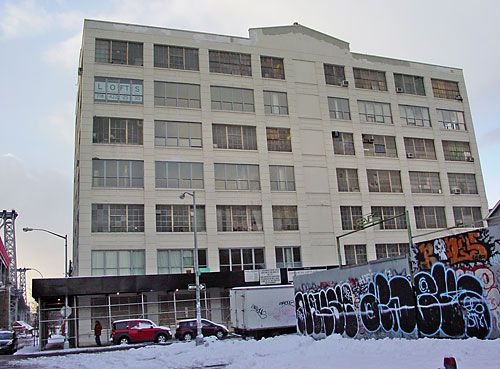A law designed to protect loft-dwellers from eviction won’t save the residents of a Williamsburg building because they signed away their rights before the legislation came into effect, a judge ruled Tuesday.
The so-called Loft Law — a state regulation revised two years ago to defend loft residents from eviction— will not protect the tenants of a Berry Street building because they signed an agreement with their landlord years before the law came into effect promising they would leave by last spring.
But after the Loft Law became the law of the land, tenants at the building between S. Third and S. Fourth streets asked a city panel to let them stay — sparking a 16-month legal war that ended with Appeals Court Justice Ariel Belen’s ruling in favor of their landlord.
“It’s over, it doesn’t matter, the court system has done its worst and we’re done,” said artist David Opdyke. “All we can do is hope the landlord won’t feel like ripping us to shreds and maybe give us a break on months of back rent.”
The ruling affirms a Brooklyn Supreme Court judge’s decision earlier this month that the Loft Law cannot be applied to long-time tenants who have already promised to move out of live-work spaces.
“The amended Loft Law does not contain any language that directs a retroactive application, thus this 2010 amendment may only be applied prospectively, and cannot affect previously accrued rights,” Bunyan said.
The state enacted the Loft Law in 1982 to regulate the residential conversion of commercial and manufacturing buildings in Manhattan, but state legislators, led by Assembly Housing Chairman Vito Lopez (D–Williamsburg), amended the legislation in 2010, extending a swath of rights and rental protections to thousands of residents living in illegally converted industrial spaces in Williamsburg, Greenpoint, Bushwick, and Gowanus.
Residents of the seven-story former noodle factory applied for rental protections last summer after then-Gov. Paterson signed the bill. But the building’s owner, Mona Gora-Friedman went to court in January 2011 demanding their immediate eviction.
Tenants charged that Gora-Friedman, who bought the property for $25 million in 2005, harassed them and cut off their water in an attempt to force them out. They stopped paying rent during the court fight, but now must pack up their things and leave one of the few remaining artists lofts in a neighborhood where live-work spaces have been gradually squeezed out by luxury residences.
“We all live and work here and we cannot afford a work space that is somewhere else from our live space,” said tenant Andrea Haenggi, a choreographer. “There aren’t really any live-work spaces left in New York.”
The decision comes as state Assembly members proposed several bills intended to strengthen rental protections by reducing the amount of rent increases from 20 percent to 10 percent after vacancies and barring landlords from recovering rent-regulated apartments for personal use.
But tenants in the Berry Street building say that legislators must also draft a bill fixing the amended Loft Law, otherwise judges will use their case as a precedent to rule in favor of landlords in future housing disputes.
“The judge’s decision clearly states that he did so because the Loft Law does not specifically tell him not to,” said Berry Street tenant Kimberlae Saul, who claims a re-worded piece of legislation would give her and other tenants a “slam dunk case.”
Assemblyman Lopez sympathized with the Berry Street residents at a meeting at Our Lady of Pompeii Church on Tuesday night and said he is trying to fix the language in the bill.
After losing the appeal, residents of the building are asking themselves what to do next.
“I have to do everything I can to make sure that my kids don’t lose their home and their neighborhood,” Saul said.
Reach reporter Aaron Short at ashort@cnglocal.com or by calling (718) 260-2547.

























